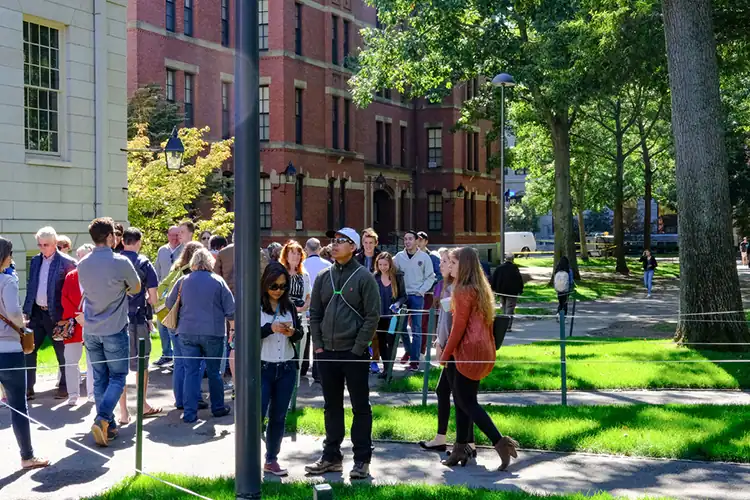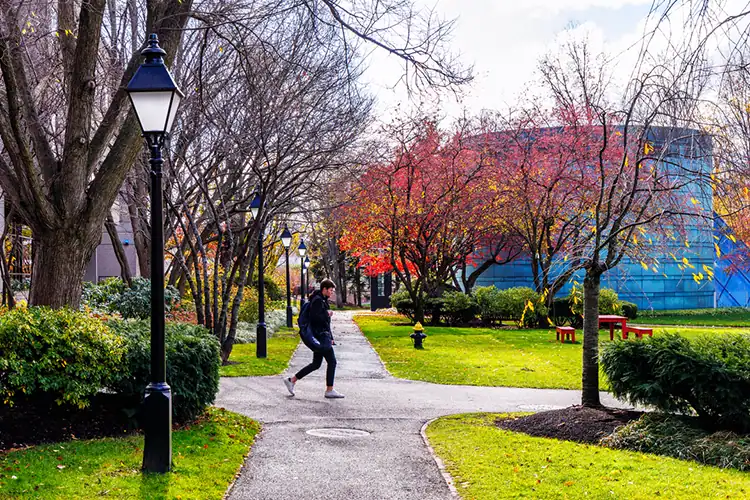10 Best Community Colleges in Massachusetts
Updated: January 8, 2026

Key Takeaways
- Massachusetts offers 15 affordable, high-quality community colleges across urban, suburban, and rural regions.
- Strong programs in healthcare, biotech, advanced manufacturing, and IT are available, all aligned with the state’s economy.
- The MassTransfer program guarantees smooth transfers to UMass and state universities.
- Small class sizes, strong student support, and generous financial aid make these schools a smart choice for career training or university transfer.
Why Should You Consider Community Colleges in Massachusetts?
If you’re thinking about starting college in Massachusetts, community colleges are one of the smartest and most affordable ways to begin. The state’s 15-campus system gives you access to quality education no matter where you live, from downtown Boston to the Berkshires. Whether you’re just out of high school, changing careers, or going back to school later in life, there’s a college and a program that fits your needs.
These schools offer strong programs in fields that actually power the state’s economy, like healthcare, biotech, advanced manufacturing, and IT. Many of them partner directly with local employers and offer hands-on training, internships, and job placement support.
And if your goal is a bachelor’s degree, you’re in luck. Through the MassTransfer program, you can start at a community college and transfer seamlessly to a UMass or state university campus. You’ll also benefit from small class sizes and instructors who actually teach, rather than graduate assistants.
Even better, tuition is typically between $4,000 and $6,000 per year for in-state students, and Massachusetts offers solid financial aid to help bring those costs down. Whether you’re looking for a stepping stone to a four-year school or a direct path into the workforce, community colleges in Massachusetts make it easier and more affordable to get ahead.

10 Best Community Colleges in Massachusetts
Massachusetts is known for its world-class universities, but its 15 public community colleges offer an equally important, and far more affordable, entry point into higher education. Whether you’re looking to transfer to UMass, earn a technical certificate, or explore a new career path, these colleges give you options across every corner of the state.
From Boston’s urban campuses to rural schools in the Berkshires, Massachusetts community colleges are aligned with the state’s booming industries like biotech, clean energy, and advanced manufacturing. They also offer small class sizes, dedicated faculty, and many student support services. Most importantly, programs are built for real outcomes, including entering the workforce quickly or transferring easily through the MassTransfer program.
Northern Essex Community College
NECC offers affordable education to students in northeastern Massachusetts with two main campuses in Haverhill and Lawrence, close to the New Hampshire border.
Main Courses
NECC offers standout programs in healthcare (especially nursing and radiologic technology), liberal arts transfer, business management, and engineering science. The college also has strong English as a Second Language (ESL) offerings to support its diverse student population.
Pros
- Two accessible campuses in major population centers
- Strong ties to local healthcare and criminal justice employers
- Excellent advising and academic support services
- MassTransfer pathways to UMass and other state universities
Cons
- Traveling between campuses may be necessary for certain courses or services
- Limited on-campus housing options
Average Annual In-State Tuition
$5,573
Bristol Community College
Serving southeastern Massachusetts, BCC operates campuses in Fall River, New Bedford, Attleboro, and Taunton, providing education across a large region with diverse needs.
Main Courses
BCC offers respected programs in nursing, dental hygiene, offshore wind technology, and culinary arts. It also features unique offerings in maritime studies and green energy technology, reflecting the area’s economic strengths.
Pros
- Wide geographic reach with multiple campus locations
- Leading programs in health and sustainability-related fields
- Strong partnerships with UMass Dartmouth and local employers
- Offers one of the few accredited dental hygiene clinics in the region
Cons
- Some programs and services are only available at specific campuses
- Students may find it challenging to coordinate classes across different locations
Average Annual In-State Tuition
$5,730
North Shore Community College
Located in the North Shore region of Massachusetts, NSCC operates campuses in Danvers and Lynn, offering access to education near Boston’s northern suburbs.
Main Courses
NSCC is known for its healthcare programs (especially nursing and respiratory care), veterinary technology, aviation science, and liberal arts transfer degrees.
Pros
- Specialized training facilities, including an on-campus aviation hangar
- Proximity to Boston job markets and local employers
- Strong partnerships with Salem State University and other four-year colleges
- Excellent student service,s including tutoring and advising
Cons
- Higher housing and commuting costs in the region
- Parking can be limited at the Lynn campus
Average Annual In-State Tuition
$6,980
Massachusetts Bay Community College
MassBay serves the MetroWest region with campuses in Wellesley Hills, Framingham, and Ashland, catering to students in one of the state’s most dynamic economic zones.
Main Courses
MassBay is nationally recognized for its automotive technology program, and also offers strong courses in cybersecurity, nursing, biotechnology, and business.
Pros
- Strategically located near Boston’s tech corridor
- State-of-the-art STEM and health science labs
- Highly diverse student body and inclusive support services
- Strong workforce pipeline with regional employers
Cons
- Relatively high cost of living in MetroWest towns
- Competitive admission to popular health science programs
Average Annual In-State Tuition
$7,460
Quinsigamond Community College
QCC is based in Worcester, the second-largest city in New England, and serves students across central Massachusetts with additional learning sites in Southbridge and Marlborough.
Main Courses
QCC offers high-demand programs in nursing, engineering technologies, manufacturing, computer science, and business administration. The college also provides early college and dual enrollment programs for high school students.
Pros
- Excellent job placement in the healthcare and manufacturing fields
- Centrally located in Worcester, with easy access to public transit
- Dedicated advising and career services for adult learners
- Strong transfer success rates to Worcester State and UMass Amherst
Cons
- Parking is limited at the main Worcester campus
- Some online course options are still limited in scope
Average Annual In-State Tuition
$7,390
Bunker Hill Community College
Bunker Hill is Boston’s largest community college, offering a wide range of academic and career training options with easy access to the city’s resources.
Main Courses:
Bunker Hill specializes in culinary arts, healthcare, business, biotechnology, and visual media arts. Many programs are directly connected to Boston’s industries.
Pros:
- Extremely diverse campus, with over 100 languages spoken
- Located right on the MBTA subway line
- Strong transfer partnerships with Boston-area universities
Cons:
- A large student population may lead to less personalized experiences
- High demand can create enrollment competition
Average Annual In-State Tuition: $7,660
This rate gives you access to education in the heart of Boston with excellent public transit access.
Greenfield Community College
Located in western Massachusetts, Greenfield Community College offers a close-knit learning environment with a focus on sustainability and the arts.
Main Courses:
Standout programs include renewable energy, outdoor leadership, visual arts, and liberal arts transfer pathways.
Pros:
- Beautiful mountain setting and arts-oriented community
- Focus on environmental education and sustainability
- Small class sizes and strong faculty engagement
Cons:
- Remote location can limit housing and transit options
- Fewer program choices compared to larger colleges
Average Annual In-State Tuition: $7,670
This investment supports a distinct academic experience in the Pioneer Valley.
Mount Wachusett Community College
Mount Wachusett serves north-central Massachusetts with practical programs in healthcare, sustainability, and technical trades.
Main Courses:
Strong offerings in healthcare, renewable energy technology, advanced manufacturing, and natural resources.
Pros:
- Leading in sustainability, with on-campus solar and wind power
- Personalized academic support and flexible scheduling
- Dual enrollment options for high school students
Cons:
- Winter weather and rural location may pose transportation challenges
- Limited nightlife or student housing
Average Annual In-State Tuition: $8,160
This tuition supports career training and sustainability initiatives in a rural setting.
Springfield Technical Community College
STCC stands out as Massachusetts’s only technical community college, located on the historic grounds of the Springfield Armory.
Main Courses:
Specializes in advanced manufacturing, healthcare, engineering technologies, and digital media. Programs are designed with technical depth and strong job alignment.
Pros:
- Unique focus on technical education with industry-grade facilities
- Strong links to regional employers in western Massachusetts
- Historic campus setting adds character and cultural appeal
Cons:
- More specialized than other community colleges, which may limit transfer opportunities for some
- The campus environment may feel different from more traditional colleges
Average Annual In-State Tuition: $8,200
This price supports hands-on, career-ready training in a one-of-a-kind historic setting.
Berkshire Community College
BCC serves students in Massachusetts’ scenic western Berkshires region with a focus on liberal arts, environmental studies, and healthcare.
Main Courses:
Notable programs include fine arts, environmental science, hospitality management, and nursing.
Pros:
- Gorgeous campus in Pittsfield, close to a thriving arts scene
- Intimate classes and strong faculty support
- Offers both associate degrees and workforce certificates
Cons:
- Rural setting means limited access to larger job markets
- Winter weather and transportation can be challenges
Average Annual In-State Tuition: $8,240
A solid investment for students seeking education in a peaceful, creative environment.
Tuition and mandatory fee amounts change regularly and can vary by program, course load, credit amount, and delivery format. The figures listed here reflect the latest numbers available and are intended for comparison only. Always confirm the current annual in-state tuition and required fees on the university’s official website before applying.

Key Requirements for Enrolling in the Best Community Colleges in Massachusetts
Massachusetts community colleges aim to make higher education accessible while ensuring students are placed in the right courses from day one. Here are the main steps you’ll need to take to enroll.
High School Diploma
Most Massachusetts community colleges require a high school diploma, GED, or HiSET credential. Dual enrollment is also available if you’re still in high school and want to earn college credits early.
Massachusetts Application Submission
You’ll need to apply through either the statewide application portal or directly through each college’s website. Application fees range from $10 to $35, but many schools waive them for students with financial need.
Placement Assessment Completion
While many colleges now use multiple measures to determine course placement, you may still need to take the Accuplacer exam or submit transcripts to assess your skills in math and English.
Residency Status Verification
To qualify for in-state tuition, you’ll need to prove you’ve lived in Massachusetts for at least six months. This often involves showing a lease, utility bills, or a state-issued ID.
Financial Aid Filing
Fill out the FAFSA and Massachusetts’ state aid application to be considered for MASSGrant, tuition waivers, or the Commonwealth Commitment, which offers extra savings for transfer students.
How Do Massachusetts Community College Costs Compare to National Averages?
Massachusetts community colleges typically charge between $6,000 and $7,000 per year in tuition for in-state students. That’s slightly higher than the national average of about $5,000, but still a great deal in a state where private college tuition can easily exceed $60,000 annually.
You’ll also have access to several generous aid programs. The MASSGrant helps lower tuition for low-income students, while tuition waivers are available for qualifying residents. If you plan to transfer, the Commonwealth Commitment can freeze tuition and offer rebates if you stay on track with a full-time course load.
For many students, this means earning a degree without taking on overwhelming debt, even in one of the most expensive states for higher education.
What Are the Tuition Fees for International Students at Community Colleges in Massachusetts?
If you’re applying as an international student, expect to pay between $10,000 and $16,000 per year at a Massachusetts community college. While this is more than in-state tuition, it’s still much less than attending a private university, where costs can exceed $50,000 annually.
Remember that international students aren’t eligible for state-based financial aid, but many colleges offer merit scholarships or grants for international learners. Some schools also offer on-campus jobs to help you manage expenses.
Also factor in other costs like:
- Mandatory health insurance (about $2,000–$3,000/year)
- Living expenses, especially in the Boston area
- Transportation and SEVIS fees
Despite these extra costs, community colleges remain one of the most affordable ways to study as an international student in Massachusetts.
How Does University of the People Compare With the Best Community Colleges in Massachusetts?
University of the People (UoPeople) offers a very different model from Massachusetts community colleges. Instead of charging tuition, UoPeople uses a tuition-free approach where you only pay modest assessment fees, typically $160 per course.
This can make UoPeople even more affordable than Massachusetts colleges, which usually cost between $4,000 and $6,000 per year for in-state students. Even with generous aid like the MASSGrant or Commonwealth Commitment, UoPeople’s total cost is often lower.
One major difference is format. UoPeople is fully online and asynchronous, which means you can study anytime, from anywhere, without being tied to a physical campus. This can be especially helpful if you work full-time or live far from a college.
UoPeople is accredited by WASC, while Massachusetts community colleges are regionally accredited by the New England Commission of Higher Education (NECHE). This may affect how easily credits transfer to other institutions.
If you’re looking for a flexible, ultra-low-cost degree option without needing to attend in person, UoPeople is a strong alternative.

Ready to Choose the Best Community College?
Massachusetts offers excellent options for students seeking affordability, quality, and flexibility. Whether you want to jump into a career or transfer to a top university, the state’s community colleges can help you get there.
Before choosing a school, think about:
- The programs that match your career goals
- How close the campus is to your home or work
- Whether you want a technical, liberal arts, or transfer-oriented experience
Financial aid opportunities like MASSGrant and the Commonwealth Commitment
Also consider long-term outcomes like graduation rates, job placement, and transfer success. By doing your research now, you’ll be better positioned to make the most of your education, without the hefty price tag of a four-year school.
FAQs
What is the cheapest community college in Massachusetts?
Northern Essex Community College and Bristol Community College are among the most affordable, with annual in-state tuition around $5,500–$5,700.
How do Massachusetts community colleges compare to state universities?
They offer lower tuition, smaller class sizes, and easier access while still providing strong transfer pathways to state universities through the MassTransfer program.
Can high school students attend Massachusetts community colleges?
Yes, many colleges offer dual enrollment programs so high school students can earn college credit before graduation.
Which Massachusetts community colleges have the highest graduation rates?
Colleges like Mount Wachusett and Greenfield Community College tend to have strong completion rates, especially for students in focused technical programs.
Are Massachusetts community colleges open to international students?
Yes, most are. However, international students pay higher tuition and should plan for additional costs like health insurance and living expenses.
Do Massachusetts community colleges offer online degree programs?
Many do. You’ll find flexible online and hybrid options, especially for general education, business, and healthcare-related programs.
